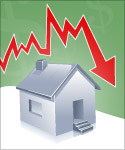More than 14 million borrowers were underwater as of Q1 2010, and with a further 10.8% decline in house prices expected relative to Q4 2009 levels, another 6 million borrowers are likely fall into negative equity by the end of 2011, according to commentary today by Deutsche Bank.
The presence of negative equity goes hand-in-hand with an increased likelihood of strategic default, as borrowers may sometimes not be willing to pay the mortgage when the house has lost substantial amounts of value. The firm noted that, even when strategic default makes economic sense, many borrowers resist on moral and social grounds, as well as from fear of legal consequences. The existence of recourse — when a lender is able to pursue a borrower's other assets — also acts as a disincentive against strategic default.
Deutsche Bank noted 11 states are considered non-recourse — though not all explicitly forbid deficiency judgments on homes or on purchase loans.
Underwater borrowers are more likely to default in non-recourse states. The greater the negative equity, the higher the cumulative default rate. “Walk away or strategic default from a house with negative equity makes economic sense, especially in locations that have less expensive rentals,” Deutsche Bank researchers said. “Many existing academic studies model homeowners' default decision based on the theoretical hypothesis that a borrower would exercise a default when it is in-the-money, i.e., when the borrower's house has negative equity. Therefore, a homeowner with negative equity would default even though they can still afford to make their mortgage payments.



